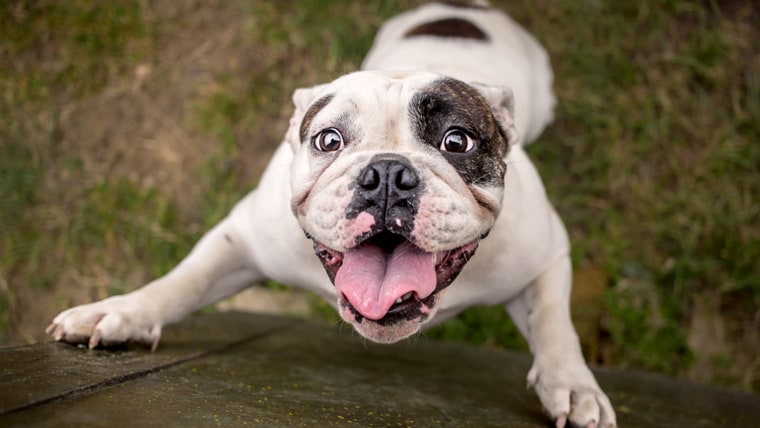Have you ever wondered how smart your furry friend is? Try these games with your dog to find out what kind of personality and intelligence your pooch really has.
Communication
Memory vs. Pointing Game
- For this game, you’ll need your dog, a partner and a timer.
- Have your partner hold your dog six feet away from you.
- Call your dog’s name and show it that you have two treats.
- Place the treats on the ground, at the same time, on either side of your body at arm’s length.
- Stand up and point to one of the treats.
- Have your partner let go of your dog as you give a release command, then hold still until the dog chooses.
- No matter which treat your dog chooses, let it have both treats.
Results:
If the dog chose the treat you’re pointing at: Then your dog pays special attention to your communicative cues or gestures. By relying on your information to determine which treat to choose, your dog is acting in a collaborative manner; something very few other animals excel at.
If your dog did not choose the treat you pointed to: Your dog may be making an independent decision. Using a self-reliance strategy means your dog decided to solve this problem on its own and may only take your information into account when your help is needed.
Empathy Empathy is the ability to feel what someone else is feeling. Humans are extremely empathetic, and researchers have suggested that many animals, including dogs, have at least a basic form of empathy. Dogs may have developed this quality because of their special relationship with humans.
Yawning Game
- For this game, you’ll need your dog, a partner and a timer.
- Start the game sitting down, with your dog standing, sitting or lying down in front of you.
- Have your partner start a timer for 30 seconds. Yawn loudly every five seconds for 30 seconds. During this time, watch your dog for a yawn.
- After 30 seconds are up, start a two-minute timer.
- Do not talk or interact with your dog; it’s OK if your dog wanders off as you long as you can see it. During this time, watch closely for a yawn from your dog.
Results:
If your dog yawned: This shows that it is more on the bonded end of the scale. Keep in mind that small dogs tend to be more individualistic than large dogs.
If your dog didn't yawn: It may just have another way of connecting with you; this doesn't mean your dog is not attached to you.

Cunning
The cunning games assess how wily or trustworthy your dog is when given the opportunity to sneak a treat. The games are based on research showing that some dogs are aware they are being watched, while other dogs are not. Among the dogs who know they are being watched, some choose to use this information to their advantage, while others do not.
Cunning vs. Wily Game
- Stand six feet away from your partner, who has your dog and a timing device.
- Place a treat four feet away from your dog.
- Say your dog’s name, then “no” twice, clearly and emphatically, while placing a treat in front of you at arm’s length. If your dog knows a specific command, such as “leave it,” use that instead.
- Have your partner release your dog gently, while simultaneously starting the timer. Do not use a verbal command to release the dog.
- Cover your eyes with your hands, using care to peek and see if your dog eats the treat. Remain silent.
- Have your partner press “stop” on the timer as soon as your dog eats the treat. If it has not eaten the treat in 90 seconds, give it the treat.
Results:
More trustworthy dogs will not use your social information to take direction from you. A wily dog will wait until you cannot see it before it takes a treat.
Please note: In the Dognition experience, you will play these games and others a number of times to be sure of the results.
The Dognition Profiles To identify your dog’s profile, you will need to complete the full assessment on Dognition.com. Each dog has a unique way of understanding the world. After completing all of the science-based Dognition games online, you’ll be able to see what’s going on behind your dog’s eyes, and you’ll receive a Dognition profile that explains how your dog understands the world. Here are the profiles at a glance:
Ace: An accomplished problem solver with great communication skills, an ace has everything that makes dogs special, plus more.
Charmer: A smooth operator, the charmer relies on a secret weapon — you.
Socialite: Social graces are the keys to the socialite’s success.
Expert: The expert can solve many problems alone, but is still part of the team.
Renaissance: The renaissance dog is good at a little bit of everything.
Protodog: The protodog is reminiscent of the first dogs that began relationships with early humans; burgeoning social skills allowed dogs like yours to become much-loved members of the human pack.
Einstein: A keen understanding of physics makes the Einstein practically a rocket scientist.
Maverick: A cheeky wolfishness and a strong independent streak are what make a maverick so successful.
Stargazer: There’s more going on in the stargazer’s mind than meets the eye.